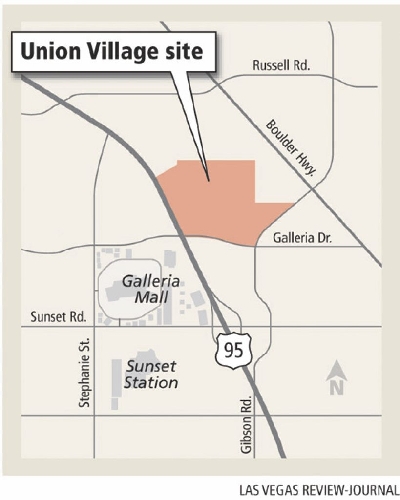Union Village project in Henderson faces extensive site work



On a 150-acre parcel in Henderson, developers envision a gleaming, billion-dollar campus of hospitals, medical offices, homes and businesses unlike anything else.
First, though, they have to spend some time down in the dirt.
Backers of the project known as Union Village expect to spend a year and a half and more than
$17 million on dirt work just to get the site ready for construction.
That’s almost $6 million more than the developer is paying to buy the property from the city of Henderson.
Work crews hired by the city started hauling dirt and rock on a portion of the site Tuesday.
The land on Galleria Drive east of U.S. Highway 95 was once used as a gravel pit, leaving large areas where the ground is as much as 25 feet lower than the surrounding property.
All of that has to be filled in carefully so the foundations of large buildings can be built on top of it.
“It’s not a matter of just spreading some dirt around,” city spokeswoman Kathleen Richards said.
The city agreed to perform a portion of the site work as part of the land sale approved last month.
The city’s part of the job is expected to take six months and involves hauling in and placing roughly 610,000 cubic yards of material, enough to fill 187 Olympic-sized swimming pools, Richards said.
The developers have a much bigger task ahead. Their share of the site work could take a year and totals approximately 2.1 million cubic yards of in-fill.
If you stacked that much rock and dirt on a football field, it would make a pile almost 1,200 feet high.
“It is a very challenging site,” said David Michael, a partner in the development group.
Union Village will be a network of free-standing hospitals, medical offices, rehabilitation centers and nursing homes that will allow patients to get all the care they need in one place without having to check in, check out or be transported between facilities in an ambulance.
Plans also include retail and restaurant space, hotels and residences, including senior housing and assisted living.
Michael called it “the first integrated health village in the world.”
The project has the full-throated support of Henderson officials, who have said it has the potential to bring tens of thousands of jobs and hundreds of millions of dollars in tax revenue to Nevada’s second-largest city.
The City Council voted June 14 to sell the 150.7 acres to Union Village LLC for $11.6 million.
The land was appraised at $18.3 million “as is” and $29.5 million fully improved, but appraisers noted that
$17.5 million in site work was needed to make it buildable.
In addition to getting partially improved land at a discounted price, the developers of Union Village might benefit from tax breaks and other incentives because the site lies within the city’s 4,500-acre Eastside Redevelopment Area.
The $1.5 billion project is the brainchild of a Southern California real estate development group that has teamed with several local firms and major national companies, including Wisconsin-based health care consulting company Hammes, Florida-based builder Haskell, and Dallas-based HKS Architects, which designed the Cowboys’ new football stadium.
Michael said their team members know what it takes to build a large-scale project, “and they eat it for lunch and dinner.”
St. Rose Dominican Hospitals is the partner on the medical facilities in the development, which include a free-standing children’s hospital and a cancer-treatment hospital.
Union Village will become the new home for the hospital group’s oldest facility, the Rose de Lima Campus now located at Boulder Highway and Lake Mead Parkway in Henderson.
Hospital officials have not decided what will be done with the current facility, which St. Rose has operated since 1947.
Michael said the first phase of Union Village is set for completion in January 2015 and includes 536 hospital beds, 400 residential units and about 250,000 square feet of retail space.
The developers picked Southern Nevada because of its need, he said. The community was already medically under-served when it became “ground zero” for the recession. “It has been a remarkable perfect storm,” he said.
Henderson was chosen because of its available property and business-friendly atmosphere, Michael said.
The city originally obtained the 150-acre property about 20 years ago in hopes of building a spring training facility for a Major League Baseball team, but that plan never came to pass.
The city will retain development rights to five acres for the development of a separate space and science museum.
Contact reporter Henry Brean at hbrean@reviewjournal.com or 702-383-0350.












